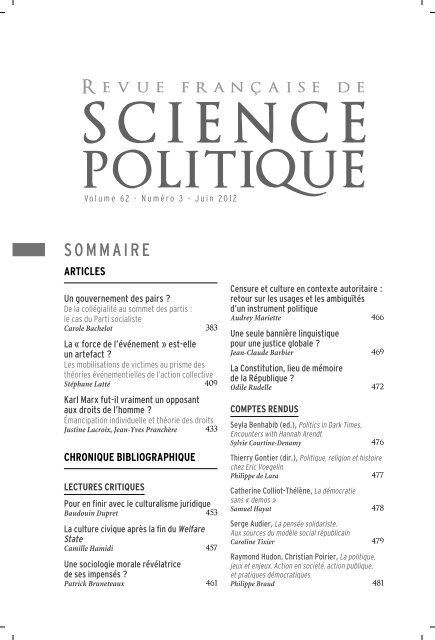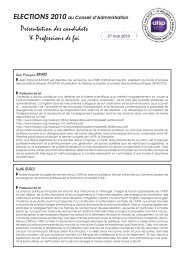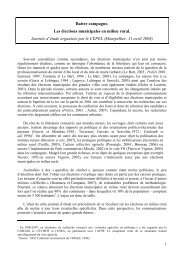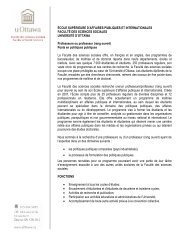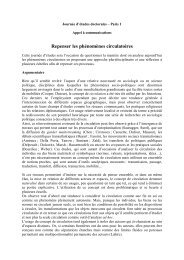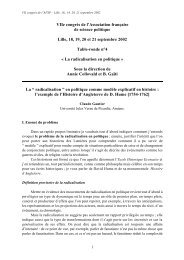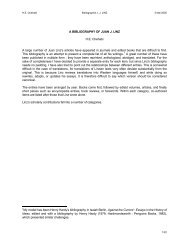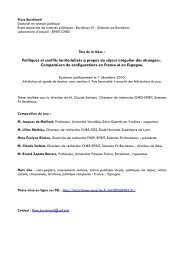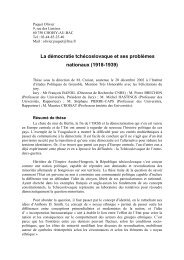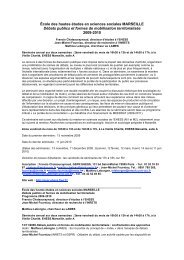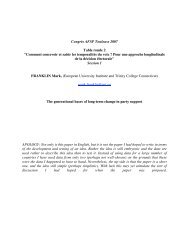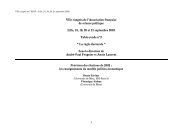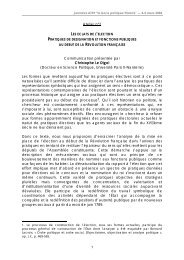Vol. 62 n°3 juin 2012 - Association française de science politique
Vol. 62 n°3 juin 2012 - Association française de science politique
Vol. 62 n°3 juin 2012 - Association française de science politique
You also want an ePaper? Increase the reach of your titles
YUMPU automatically turns print PDFs into web optimized ePapers that Google loves.
SOMMAIREARTICLESUn gouvernement <strong>de</strong>s pairs ?De la collégialité au sommet <strong>de</strong>s partis :le cas du Parti socialisteCarole Bachelot 383La « force <strong>de</strong> l’événement » est-elleun artefact ?Les mobilisations <strong>de</strong> victimes au prisme <strong>de</strong>sthéories événementielles <strong>de</strong> l’action collectiveStéphane Latté 409Karl Marx fut-il vraiment un opposantaux droits <strong>de</strong> l’homme ?Émancipation individuelle et théorie <strong>de</strong>s droitsJustine Lacroix, Jean-Yves Pranchère 433CHRONIQUE BIBLIOGRAPHIQUELECTURES CRITIQUESPour en finir avec le culturalisme juridiqueBaudouin Dupret 453La culture civique après la fin du WelfareStateCamille Hamidi 457Une sociologie morale révélatrice<strong>de</strong> ses impensés ?Patrick Bruneteaux 461Censure et culture en contexte autoritaire :retour sur les usages et les ambiguïtésd’un instrument <strong>politique</strong>Audrey Mariette 466Une seule bannière linguistiquepour une justice globale ?Jean-Clau<strong>de</strong> Barbier 469La Constitution, lieu <strong>de</strong> mémoire<strong>de</strong> la République ?Odile Ru<strong>de</strong>lle 472COMPTES RENDUSSeyla Benhabib (ed.), Politics in Dark Times.Encounters with Hannah ArendtSylvie Courtine-Denamy 476Thierry Gontier (dir.), Politique, religion et histoirechez Eric VoegelinPhilippe <strong>de</strong> Lara 477Catherine Colliot-Thélène, La démocratiesans « <strong>de</strong>mos »Samuel Hayat 478Serge Audier, La pensée solidariste.Aux sources du modèle social républicainCaroline Tixier 479Raymond Hudon, Christian Poirier, La <strong>politique</strong>,jeux et enjeux. Action en société, action publique,et pratiques démocratiquesPhilippe Braud 481
Bernard Lamizet, Le langage <strong>politique</strong>.Discours. Images. PratiquesMagali Guaresi 524Ludovic Tournès, Sciences <strong>de</strong> l’homme et <strong>politique</strong>.Les fondations philanthropiques américainesen France au 20 e siècleElisa Chelle 525Xavier Dupré <strong>de</strong> Boulois, Martine Kaluszynski(dir.), Le droit en révolution(s). Regards surla critique du droit <strong>de</strong>s années 1970 à nos joursGeneviève Koubi 527Patrick Le Louarn (dir.), Le patrimoine culturelet la décentralisationEmmanuel Négrier 528REVUE DES REVUES 531RÉSUMÉS, ABSTRACTS 543
ABSTRACTSRÉSUMÉSCarole BachelotUN GOUVERNEMENT DES PAIRS ?DE LA COLLÉGIALITÉ AU SOMMET DES PARTIS :LE CAS DU PARTI SOCIALISTEDepuis les travaux <strong>de</strong> l’école élitiste, lespartis et a fortiori leurs dirigeants sontsouvent étudiés en fonction <strong>de</strong> relations hiérarchiquesd’autorité, elles-mêmes contraintespar la quête du pouvoir. Or, l’étu<strong>de</strong> <strong>de</strong> ces dirigeantsgagnerait à porter davantage sur lesrelations existant entre « pairs » au sommet<strong>de</strong>s organisations. En se fondant sur l’exempledu Parti socialiste, cet article fait ainsi appel àla notion <strong>de</strong> collégialité empruntée à la sociologie<strong>de</strong>s organisations pour rendre compte <strong>de</strong>la tension entre égalité formelle et différenciationsentre dirigeants. Ces relations conditionnenten effet leurs activités : négociation, délibération,décision.A PEER LEADERSHIP ?COLLEGIALITY AT THE TOP OF THE POLITICALPARTIES : A CASE STUDY OF THE FRENCHSOCIALIST PARTYn line with the elitist perspective, parties andI their lea<strong>de</strong>rs have been mostly studied in termsof top down power relationships which are themselvesframed by electoral strategies. However,more attention should be paid to internal relationshipsbetween “peers” which occur at the top ofpolitical organizations. Based on an empiricalstudy of the French Socialist Party, this paper aimsto <strong>de</strong>monstrate that the notion of collegiality, borrowedto the sociology of organizations is helpfulto un<strong>de</strong>rstand these complex relationships.Relying on tensions between formal equality andstatutory differentiations, they impact their specificactivities, such as negotiation, <strong>de</strong>liberationand <strong>de</strong>cisions.Stéphane LattéLA « FORCE DE L’ÉVÉNEMENT » EST-ELLE UNARTEFACT ?LES MOBILISATIONS DE VICTIMESAU PRISME DES THÉORIES ÉVÉNEMENTIELLESDE L’ACTION COLLECTIVEÀpartir d’une enquête consacrée aux associations<strong>de</strong> victimes d’acci<strong>de</strong>nts collectifs,cet article interroge les vertus et les limites <strong>de</strong>sconcepts proposés par la sociologie <strong>de</strong>s mobilisationspourrendrecomptedurôle<strong>de</strong>l’événementdramatique dans le déclenchement <strong>de</strong>l’action collective. À partir d’une analyse <strong>de</strong>srelations d’enquête, l’auteur montre que les narrations<strong>de</strong> l’événement dans les termes d’un« choc » procè<strong>de</strong>nt moins <strong>de</strong>s émotions immédiatementressenties par les individus que <strong>de</strong>snormes qui encadrent le contexte <strong>de</strong> catastrophe,<strong>de</strong>s prescriptions journalistiques et durôle social <strong>de</strong> « victime ». Dès lors, cet articlemilite pour une approche ethnographique quipermette d’échapper au tropisme <strong>de</strong> l’événementet <strong>de</strong> réinscrire ces mobilisations « acci<strong>de</strong>ntelles» dans <strong>de</strong>s contextes sociaux enracinés.IS THE “FORCE OF THE EVENT” AN ARTIFACT ?VICTIM MOVEMENTS AND THEORIESOF COLLECTIVE ACTIONased on a survey on victim associations, thisB article examines the virtues and limitations ofconcepts such as “moral shock” proposed by socialmovements studies for highlighting the catalyticeffect of dramatic events on the onset of collectiveaction. The author explains how the narratives of theevent in terms of “shock” is less <strong>de</strong>pen<strong>de</strong>nt on emotionsfelt by victims than on norms imposed by thedisaster frame, journalistic expectations and thesocial role of victims. The ethnographic approach<strong>de</strong>monstrates how the event functions as a screenthat obscures the fact that many victim groups arebased on <strong>de</strong>eply rooted social i<strong>de</strong>ntities and preexistingorganizational network. The victims are not onlycaptive of the event, but they take hold of the eventas an opportunity for collective action.❘ REVUE FRANÇAISE DE SCIENCE POLITIQUE ❘ VOL. <strong>62</strong> N o 3 ❘ <strong>2012</strong>
544 ❘ Revue française <strong>de</strong> <strong>science</strong> <strong>politique</strong>Justine Lacroix et Jean-Yves PranchèreKARL MARX FUT-IL VRAIMENT UN OPPOSANTAUX DROITS DE L’HOMME ?ÉMANCIPATION INDIVIDUELLE ET THÉORIE DESDROITSDans un ouvrage récent, David Leopolds’inscrit en faux contre la thèse, reçuedésormais à titre d’évi<strong>de</strong>nce, d’une oppositionradicale entre la pensée <strong>de</strong> Marx et les revendications<strong>de</strong>s droits <strong>de</strong> l’homme. Cette réévaluationstimulante ne suffit pas à dissiper lacritique adressée par le jeune Marx aux droits<strong>de</strong> l’homme – critique que ses écrits <strong>de</strong> maturitéradicalisent. On peut cependant, sans prétendredéceler chez l’auteur du Capital uneappréciation positive du droit, soutenir que sapensée souffre sur ce point d’une faiblesselogique. On voit mal, en effet, commentl’émancipation individuelle – la visée du communismeselon Marx – peut se passer d’unerevendication <strong>de</strong> droit. C’est pourquoi il n’estpas impossible <strong>de</strong> réinscrire l’intentionémancipatrice <strong>de</strong> Marx, en dépit <strong>de</strong> Marx luimême,dans la tradition <strong>de</strong>s droits <strong>de</strong> l’homme.KARL MARX, ADVERSARY OF HUMAN RIGHTS ?INDIVIDUAL EMANCIPATION AND THE THEORY OFRIGHTSn a recent publication, David Leopold mountedI an attack on a theory long treated as receivedwisdom : the notion that Marxist thought is radicallyopposed to human rights claims. Thisthought-provoking revision is not enough to invalidateMarx's early critiques of human rights, whichbecame more categorical in his mature writings.Yet we can i<strong>de</strong>ntify a logical weakness in Marx'sthought on the subject whilst fully recognising thatthe author of Capital was no positive advocate ofrights either. The basic paradox is this : how canindividual emancipation – the ultimate goal of communismin Marx's view – be achieved withoutrights being claimed ? This question opens the wayfor a rethinking of Marxist i<strong>de</strong>as on human emancipationas part of the tradition of human rights– Marx's own critiques of that traditionnotwithstanding.❘ REVUE FRANÇAISE DE SCIENCE POLITIQUE ❘ VOL. <strong>62</strong> N o 3 ❘ <strong>2012</strong>


